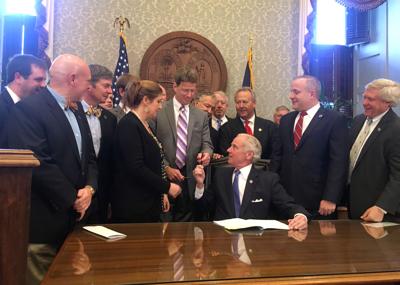Gov. Henry McMaster signed legislation Wednesday limiting the public's ability to challenge business or industrial development permits on environmental grounds.
The law, called "automatic stay," puts a 90-day limit on the amount of time a judge could issue a "stay," or stop order, on a project from going ahead while an environmental permit is appealed to the state's Administrative Law Court.
It also puts a 30-day limit on the time a permit could be appealed.
Previously, there were no time limits and state-issued permits could be held up indefinitely.
The stays had become a go-to legal tactic by environmentalists and concerned citizen groups to stall new development over their concerns. Development interests countered it unfairly penalized them and added to a project's cost.
The legal option had been used in a number of high-profile conservation challenges, including the ongoing fight over building a wall and a road to a proposed development on Capt. Sam's Spit on Kiawah Island.
"The purpose of this is to save time," McMaster said of signing the bill.
Its goals match with President Donald Trump's attempts to build infrastructure more quickly by limiting the number of environmental permits a new highway needs, McMaster said.
"We know that lawsuits are part of American life, part of our system, but very often, they drag on for too long unnecessarily," he said.
"We've got a lot of work to do on infrastructure and this will help do it," he added.
Sen. Luke Rankin, R-Conway, called the bill a "balance" of environmental concerns between the needs of industry, commerce and economic development. He said it shifts the burden of proof to the groups challenging the permits.
"If you are trying to oppose something, you've got to put up," he said.
"Today is a win for the taxpayers of South Carolina, and it's a win for the businesses who said 'enough of the frivolous legal challenges,' " said Rep. Russell Fry, R-Surfside Beach. "We can't hold up projects throughout South Carolina for baseless accusations."
Conservationists had called the bill the biggest battle they would face this legislative session.
Despite the time limits to environmental challenges, the bill keeps open the opportunity to appeal to a higher court any permit decision made in the Administrative Law Court, said Benton Wislinski, the Sierra Club South Carolina chapter lobbyist.
It also leaves the developer liable for any environmental damage done before the higher court hears that appeal, he said.
"We do not compromise on efforts that seek to roll back citizens’ rights to protect the natural world we all live in, that advance the fleecing of private citizens by utilities, nor efforts that prevent the public from being part of the process," Wislinski said.








